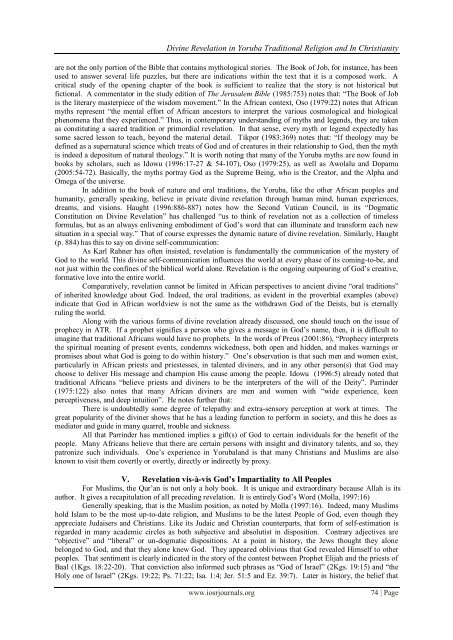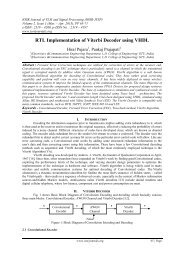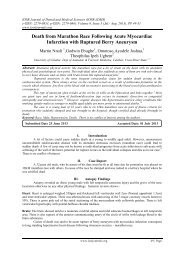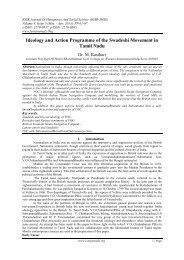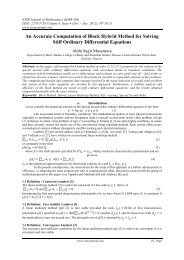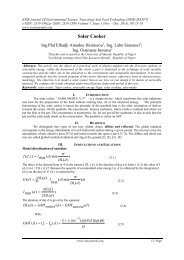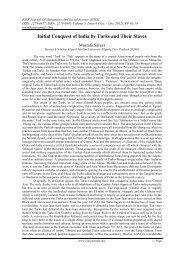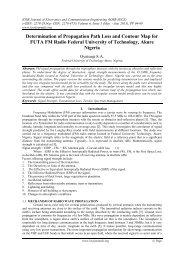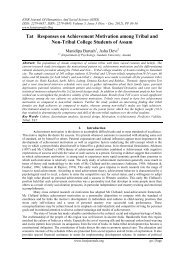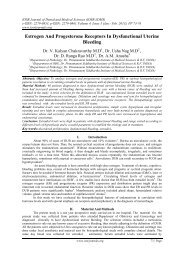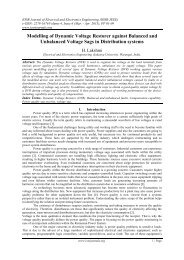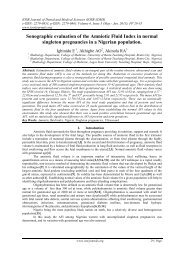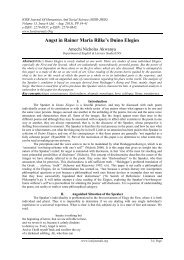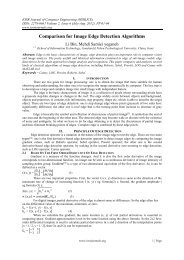Design Compatibility of Classroom Furniture in Urban and ... - IOSR
Design Compatibility of Classroom Furniture in Urban and ... - IOSR
Design Compatibility of Classroom Furniture in Urban and ... - IOSR
Create successful ePaper yourself
Turn your PDF publications into a flip-book with our unique Google optimized e-Paper software.
Div<strong>in</strong>e Revelation <strong>in</strong> Yoruba Traditional Religion <strong>and</strong> In Christianity<br />
are not the only portion <strong>of</strong> the Bible that conta<strong>in</strong>s mythological stories. The Book <strong>of</strong> Job, for <strong>in</strong>stance, has been<br />
used to answer several life puzzles, but there are <strong>in</strong>dications with<strong>in</strong> the text that it is a composed work. A<br />
critical study <strong>of</strong> the open<strong>in</strong>g chapter <strong>of</strong> the book is sufficient to realize that the story is not historical but<br />
fictional. A commentator <strong>in</strong> the study edition <strong>of</strong> The Jerusalem Bible (1985:753) notes that: “The Book <strong>of</strong> Job<br />
is the literary masterpiece <strong>of</strong> the wisdom movement.” In the African context, Oso (1979:22) notes that African<br />
myths represent “the mental effort <strong>of</strong> African ancestors to <strong>in</strong>terpret the various cosmological <strong>and</strong> biological<br />
phenomena that they experienced.” Thus, <strong>in</strong> contemporary underst<strong>and</strong><strong>in</strong>g <strong>of</strong> myths <strong>and</strong> legends, they are taken<br />
as constitut<strong>in</strong>g a sacred tradition or primordial revelation. In that sense, every myth or legend expectedly has<br />
some sacred lesson to teach, beyond the material detail. Tikpor (1983:369) notes that: “If theology may be<br />
def<strong>in</strong>ed as a supernatural science which treats <strong>of</strong> God <strong>and</strong> <strong>of</strong> creatures <strong>in</strong> their relationship to God, then the myth<br />
is <strong>in</strong>deed a depositum <strong>of</strong> natural theology.” It is worth not<strong>in</strong>g that many <strong>of</strong> the Yoruba myths are now found <strong>in</strong><br />
books by scholars, such as Idowu (1996:17-27 & 54-107), Oso (1979:25), as well as Awolalu <strong>and</strong> Dopamu<br />
(2005:54-72). Basically, the myths portray God as the Supreme Be<strong>in</strong>g, who is the Creator, <strong>and</strong> the Alpha <strong>and</strong><br />
Omega <strong>of</strong> the universe.<br />
In addition to the book <strong>of</strong> nature <strong>and</strong> oral traditions, the Yoruba, like the other African peoples <strong>and</strong><br />
humanity, generally speak<strong>in</strong>g, believe <strong>in</strong> private div<strong>in</strong>e revelation through human m<strong>in</strong>d, human experiences,<br />
dreams, <strong>and</strong> visions. Haught (1996:886-887) notes how the Second Vatican Council, <strong>in</strong> its “Dogmatic<br />
Constitution on Div<strong>in</strong>e Revelation” has challenged “us to th<strong>in</strong>k <strong>of</strong> revelation not as a collection <strong>of</strong> timeless<br />
formulas, but as an always enliven<strong>in</strong>g embodiment <strong>of</strong> God‟s word that can illum<strong>in</strong>ate <strong>and</strong> transform each new<br />
situation <strong>in</strong> a special way.” That <strong>of</strong> course expresses the dynamic nature <strong>of</strong> div<strong>in</strong>e revelation. Similarly, Haught<br />
(p. 884) has this to say on div<strong>in</strong>e self-communication:<br />
As Karl Rahner has <strong>of</strong>ten <strong>in</strong>sisted, revelation is fundamentally the communication <strong>of</strong> the mystery <strong>of</strong><br />
God to the world. This div<strong>in</strong>e self-communication <strong>in</strong>fluences the world at every phase <strong>of</strong> its com<strong>in</strong>g-to-be, <strong>and</strong><br />
not just with<strong>in</strong> the conf<strong>in</strong>es <strong>of</strong> the biblical world alone. Revelation is the ongo<strong>in</strong>g outpour<strong>in</strong>g <strong>of</strong> God‟s creative,<br />
formative love <strong>in</strong>to the entire world.<br />
Comparatively, revelation cannot be limited <strong>in</strong> African perspectives to ancient div<strong>in</strong>e “oral traditions”<br />
<strong>of</strong> <strong>in</strong>herited knowledge about God. Indeed, the oral traditions, as evident <strong>in</strong> the proverbial examples (above)<br />
<strong>in</strong>dicate that God <strong>in</strong> African worldview is not the same as the withdrawn God <strong>of</strong> the Deists, but is eternally<br />
rul<strong>in</strong>g the world.<br />
Along with the various forms <strong>of</strong> div<strong>in</strong>e revelation already discussed, one should touch on the issue <strong>of</strong><br />
prophecy <strong>in</strong> ATR. If a prophet signifies a person who gives a message <strong>in</strong> God‟s name, then, it is difficult to<br />
imag<strong>in</strong>e that traditional Africans would have no prophets. In the words <strong>of</strong> Preus (2001:86), “Prophecy <strong>in</strong>terprets<br />
the spiritual mean<strong>in</strong>g <strong>of</strong> present events, condemns wickedness, both open <strong>and</strong> hidden, <strong>and</strong> makes warn<strong>in</strong>gs or<br />
promises about what God is go<strong>in</strong>g to do with<strong>in</strong> history.” One‟s observation is that such men <strong>and</strong> women exist,<br />
particularly <strong>in</strong> African priests <strong>and</strong> priestesses, <strong>in</strong> talented div<strong>in</strong>ers, <strong>and</strong> <strong>in</strong> any other person(s) that God may<br />
choose to deliver His message <strong>and</strong> champion His cause among the people. Idowu (1996:5) already noted that<br />
traditional Africans “believe priests <strong>and</strong> div<strong>in</strong>ers to be the <strong>in</strong>terpreters <strong>of</strong> the will <strong>of</strong> the Deity”. Parr<strong>in</strong>der<br />
(1975:122) also notes that many African div<strong>in</strong>ers are men <strong>and</strong> women with “wide experience, keen<br />
perceptiveness, <strong>and</strong> deep <strong>in</strong>tuition”. He notes further that:<br />
There is undoubtedly some degree <strong>of</strong> telepathy <strong>and</strong> extra-sensory perception at work at times. The<br />
great popularity <strong>of</strong> the div<strong>in</strong>er shows that he has a lead<strong>in</strong>g function to perform <strong>in</strong> society, <strong>and</strong> this he does as<br />
mediator <strong>and</strong> guide <strong>in</strong> many quarrel, trouble <strong>and</strong> sickness.<br />
All that Parr<strong>in</strong>der has mentioned implies a gift(s) <strong>of</strong> God to certa<strong>in</strong> <strong>in</strong>dividuals for the benefit <strong>of</strong> the<br />
people. Many Africans believe that there are certa<strong>in</strong> persons with <strong>in</strong>sight <strong>and</strong> div<strong>in</strong>atory talents, <strong>and</strong> so, they<br />
patronize such <strong>in</strong>dividuals. One‟s experience <strong>in</strong> Yorubal<strong>and</strong> is that many Christians <strong>and</strong> Muslims are also<br />
known to visit them covertly or overtly, directly or <strong>in</strong>directly by proxy.<br />
V. Revelation vis-à-vis God’s Impartiality to All Peoples<br />
For Muslims, the Qur‟an is not only a holy book. It is unique <strong>and</strong> extraord<strong>in</strong>ary because Allah is its<br />
author. It gives a recapitulation <strong>of</strong> all preced<strong>in</strong>g revelation. It is entirely God‟s Word (Molla, 1997:16)<br />
Generally speak<strong>in</strong>g, that is the Muslim position, as noted by Molla (1997:16). Indeed, many Muslims<br />
hold Islam to be the most up-to-date religion, <strong>and</strong> Muslims to be the latest People <strong>of</strong> God, even though they<br />
appreciate Judaisers <strong>and</strong> Christians. Like its Judaic <strong>and</strong> Christian counterparts, that form <strong>of</strong> self-estimation is<br />
regarded <strong>in</strong> many academic circles as both subjective <strong>and</strong> absolutist <strong>in</strong> disposition. Contrary adjectives are<br />
“objective” <strong>and</strong> “liberal” or un-dogmatic dispositions. At a po<strong>in</strong>t <strong>in</strong> history, the Jews thought they alone<br />
belonged to God, <strong>and</strong> that they alone knew God. They appeared oblivious that God revealed Himself to other<br />
peoples. That sentiment is clearly <strong>in</strong>dicated <strong>in</strong> the story <strong>of</strong> the contest between Prophet Elijah <strong>and</strong> the priests <strong>of</strong><br />
Baal (1Kgs. 18:22-20). That conviction also <strong>in</strong>formed such phrases as “God <strong>of</strong> Israel” (2Kgs. 19:15) <strong>and</strong> “the<br />
Holy one <strong>of</strong> Israel” (2Kgs. 19:22; Ps. 71:22; Isa. 1:4; Jer. 51:5 <strong>and</strong> Ez. 39:7). Later <strong>in</strong> history, the belief that<br />
www.iosrjournals.org<br />
74 | Page


